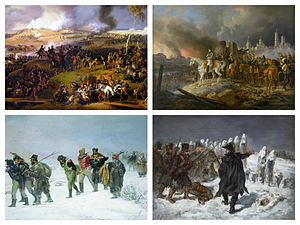French invasion of Russia (1812)
| French Invasion of Russia | |||||||
|---|---|---|---|---|---|---|---|
| Part of the Napoleonic Wars | |||||||
 Clockwise from top left: The Battle of Borodino by Louis Lejeune; The Fire of Moscow by Albrecht Adam; Marshal Ney at the battle of Kaunas by Auguste Raffet; French retreat by Illarion Pryanishnikov |
|||||||
|
|||||||
| Belligerents | |||||||
|
|
||||||
| Commanders and leaders | |||||||
| Strength | |||||||
|
Grande Armée: c. 685,000 1,393 guns 180,000–200,000 horses |
|
||||||
| Casualties and losses | |||||||
|
470,000–530,000
|
410,000
|
||||||
| 1,000,000 soldiers and civilians dead | |||||||
Decisive Russian victory
470,000–530,000
410,000
The French invasion of Russia, known in Russia as the Patriotic War of 1812 (Russian: Отечественная война 1812 года Otechestvennaya Voyna 1812 Goda) and in France as the Russian Campaign (French: Campagne de Russie), began on 24 June 1812 when Napoleon's Grande Armée crossed the Neman River in an attempt to engage and defeat the Russian army. Napoleon hoped to compel Tsar Alexander I of Russia to cease trading with British merchants through proxies in an effort to pressure the United Kingdom to sue for peace. The official political aim of the campaign was to liberate Poland from the threat of Russia. Napoleon named the campaign the Second Polish War to gain favor with the Poles and provide a political pretext for his actions.
The Grande Armée was a very large force, numbering 680,000 soldiers (including 300,000 of French departments). It was the largest army ever assembled in the history of warfare up to that point. Through a series of long marches Napoleon pushed the army rapidly through Western Russia in an attempt to bring the Russian army to battle, winning a number of minor engagements and a major battle at Smolensk in August. Napoleon hoped the battle would win the war for him, but the Russian army slipped away and continued the retreat, leaving Smolensk to burn. French plans to quarter at Smolensk were abandoned, and Napoleon pressed his army on after the Russians. As the Russian army fell back, the Cossacks applied scorched-earth tactics, burning down villages, towns and crops and forcing the French to rely on a supply system that was incapable of feeding the large army in the field.
...
Wikipedia
